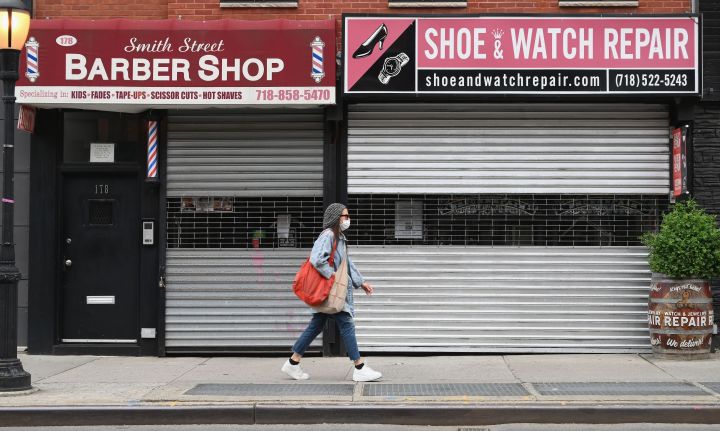
The shoe economy, almost a year into the pandemic
The shoe economy, almost a year into the pandemic

I was at a shoe store in Brooklyn, New York, the other day when I saw a display of black leather ballet flats. They kind of stopped me in my tracks.
The store is called Soula and the owner, Rick Lee, was showing me around when we came upon the flats.
They were the kind women used to wear to the office: perfectly appropriate, moderately uncomfortable and a mainstay of business casual.
“The ballet flat business is very slow right now,” Lee said.
I asked him: How long has he had them?
“Basically since the beginning of COVID,” he said.

We live differently than we did before the pandemic — in so many ways, big and small. And that has led us to shop differently too. Case in point: With so many people staying home in their slippers all day, shoe sales have fallen dramatically. And you can see this change in consumer behavior play out in the economy.
Soula’s sales are down 60% year over year.
“There’s less of a need for people to dress up, go to work,” Lee said.
Or go anywhere, really.
Even people who might like to buy new shoes can’t necessarily afford them right now.
“It’s very tenuous,” he said.
And not just for shoe sellers. There’s a shoe repair shop right across the street.
When I walked in, the owner, Joseph Davydov, was standing behind a glass case filled with brushes and polish. The wall was lined with ticking clocks — he fixes those too.
“I used to open up shop at 8 a.m., and people used to wait in front of my shop,” he said. “And I used to be upset at myself, like I’m a minute late or five minutes late, and there’s two people waiting. Now, between 8 a.m. and 9 a.m., there’s nobody.”
His sales are down by 70%.
“One of the reasons I’m able to survive is my landlord has reduced the rent,” he said.

They know each other — he’s been a tenant there for 10 years. And he said his landlord probably doesn’t want the shop to sit empty.
Half a mile away, in an empty hotel lobby in downtown Brooklyn, two empty chairs sat on a platform surrounded by rags and shoe polish.
This is where I found Marco Orosco. He’s been shining shoes for more than 20 years. Before the pandemic, these chairs were filled all week, he said.
“Here in the hotel was a lot of parties, weddings, all that stuff. So the people likes to be nice and shiny,” Orosco said.
![]()
Marco Orosco’s shoe repair kiosk in the lobby of the New York Marriott at the Brooklyn Bridge (Marielle Segarra/Marketplace) ![]()
He also got a lot of business from the lawyers and government employees who worked across the street at courthouses and city buildings that are quiet now.
So all day, Orosco sits. And waits.
“I’m coming just in case,” he said. “Sometimes I don’t do anything. Sometimes I get like maybe one or two customers in the day.”
He said he doesn’t have to pay rent right now. The hotel is giving him a break until business picks up. But he has other bills, so he may have to shut down and find other work.
Everything’s up in the air. And that’s one of the hardest things about this crisis.
Brooklyn Running Co. is a shoe store in the Williamsburg neighborhood. Inside, it’s very Brooklyn hip, with a red brick wall and rustic wooden shelves that display running shoes.

“I just don’t know what the future holds,” said Kate Reese, general manager. “I don’t know how long this is going to last.”
Reese said the problem is that in the shoe business, you have to lock in orders many months ahead of time.
“All my orders through basically December of 2021 are in, and I lose so much sleep over that,” she said.
Because it’s not clear what sales will look like this year. Her customers buy different shoes if they’re about to run a race. Will the New York City Marathon happen in November? Who knows?
“You know, we want to have really fun options and lots of options when people come in to get fitted,” she said. “But I am careful to make sure that I don’t have way too many shoes sitting in the back and no dollars to pay staff or to pay electricity or pay rent.”
She’s had to make her bets for the rest of the year not knowing when the virus will be under control.
It’s another way that businesses like hers could be feeling the effects of the pandemic even after it’s over.
Has the way you shop changed during the pandemic? Tell us your story.
There’s a lot happening in the world. Through it all, Marketplace is here for you.
You rely on Marketplace to break down the world’s events and tell you how it affects you in a fact-based, approachable way. We rely on your financial support to keep making that possible.
Your donation today powers the independent journalism that you rely on. For just $5/month, you can help sustain Marketplace so we can keep reporting on the things that matter to you.














